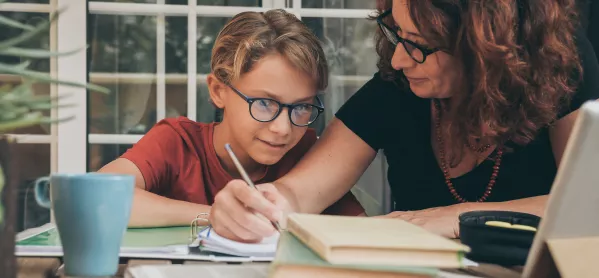Homeschooling on rise amid school Covid safety fears

The number of children being homeschooled in England has risen due to school safety concerns among parents, school leaders say.
Paul Whiteman, general secretary of the NAHT school leaders’ union, said: “The concern is that many appear to have chosen home education because they have lost faith in the government’s approach to school safety during the pandemic.”
He added there was a “clear safeguarding concern”. This was because there was no legal obligation for a parent to provide any notification to a school about the withdrawal of a child to be home educated.
He said: “It could lead to a child at risk of being missed, with neither school nor local authority knowing for certain what has happened to them. Without an officially maintained register, there remains the risk of children becoming lost outside system.
“The government must find out the reasons behind so many more families choosing home education.”
MPs: DfE’s lack of homeschooling data is ‘astonishing’
Spielman: Ofsted chief backs home education register plan
Opinion: Home truths about home education
The Association of Directors of Children’s Services (ADCS) estimated 115,542 children and young people were being home educated at some point during the 2020-21 academic year, a third more (34 per cent) than the previous year.
The ADCS said the most common reason parents decided to homeschool children was due to concerns over Covid-19.
It added that local authorities said they had been notified by parents who were pulling children out of school because they had become concerned over their emotional health, anxiety and mental health needs.
In a snapshot comparison, the ADCS also looked at the number of children being homeschooled on school census day on 7 October this year. It concluded an estimated 81,196 children were being homeschooled across all 152 local authorities in England - a rise of seven per cent from the same school census day the year before.
Its report said the number of children being electively home educated has been growing 20 per cent each year for the past five years.
A total of 117 local authorities told ADCS they provided support to families with children being home educated using video calls, phone calls and meetings. The authorities said there was a “huge loophole in elective home schooling’s national policy, which makes the existing policy unsafe”.
In a comment made in the report, it was said: “There needs to be a statutory duty implemented to ensure our children who are home educated are learning, have regular home visits (that are statutory, not parental option) so the child is seen and to observe the work taking place.”
Gail Tolley, chair of the ADCS’s Educational Achievement Policy Committee, said: “Every child has the right to a suitable education, and we recognise that parents have the right to educate their child at home.
“For six years now, we have seen year-on-year increases in the number of children being educated at home. This report highlights just how much of an impact the pandemic and the closure of some schools has had on this number.
“Local authorities have a duty to ensure that children being educated at home are safe and receiving a good education, yet we do not have a role in assurance of this, nor is there adequate guidance on what a suitable education looks like.
“ADCS is concerned that without powers to see both the child and their place of learning, we cannot know that these children are receiving a suitable education in a safe and appropriate learning environment.”
She said ADCS is calling on the government to establish a mandatory register of all electively home educated children, with a duty on the local authority to visit the child to assess their education provided.
Councillor Anntoinette Bramble, chair of the Local Government Association’s Children and Young People Board, said local authorities need to be given more powers to enter homes to ensure children are receiving a suitable education.
She said: “Although most parents and carers provide a good home education, the LGA is concerned that the pandemic has led to increasing numbers of children receiving education outside the classroom and missing out on the benefits that a school environment brings, such as safeguarding and learning and socialising with other children.”
A Department for Education spokesperson said: “We support parents who want to educate their children at home. However, now more than ever, it is absolutely vital that any decision to home educate is made with the child’s best interests at the forefront of parents’ minds.
“We have provided guidance for councils and parents to help them in situations where home education is being considered, and remain committed to a registration system for children not in school, which will help councils with their existing duty to make sure all children receive a suitable education.
“Further details on the register will be set out in our upcoming consultation response.”
You need a Tes subscription to read this article
Subscribe now to read this article and get other subscriber-only content:
- Unlimited access to all Tes magazine content
- Exclusive subscriber-only stories
- Award-winning email newsletters
Already a subscriber? Log in
You need a subscription to read this article
Subscribe now to read this article and get other subscriber-only content, including:
- Unlimited access to all Tes magazine content
- Exclusive subscriber-only stories
- Award-winning email newsletters
topics in this article



